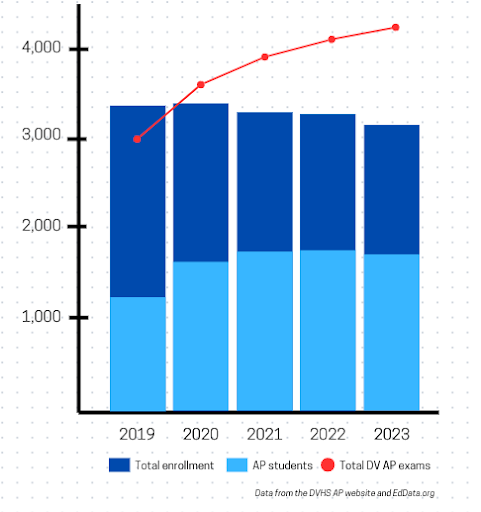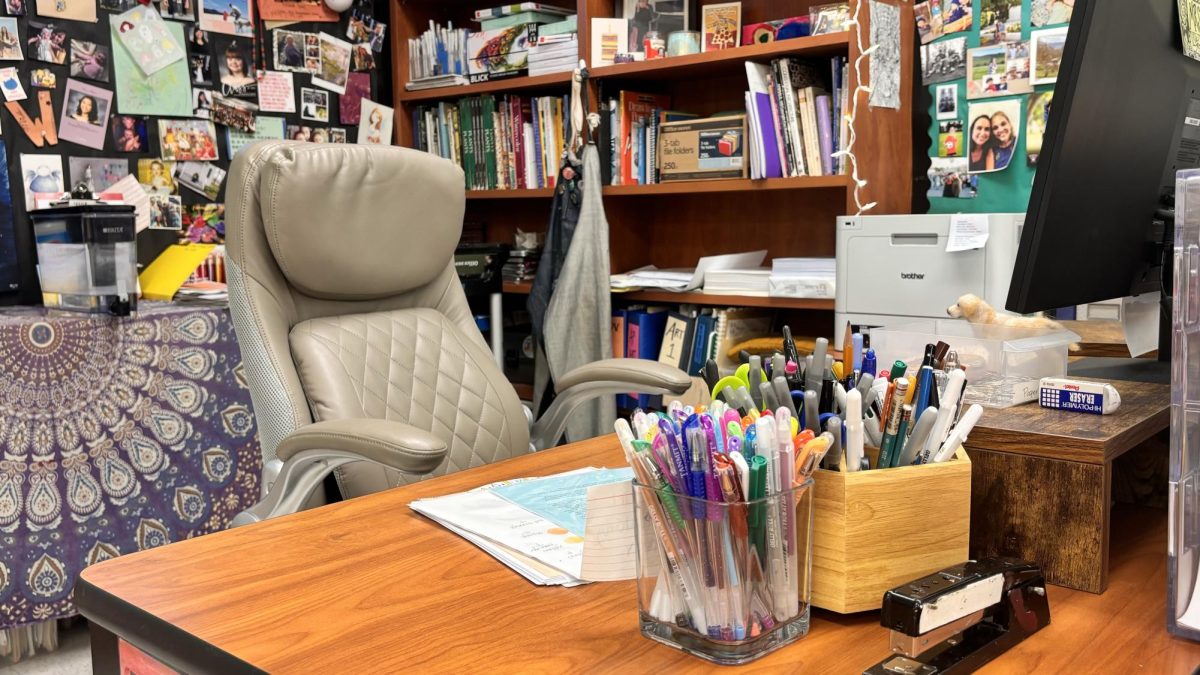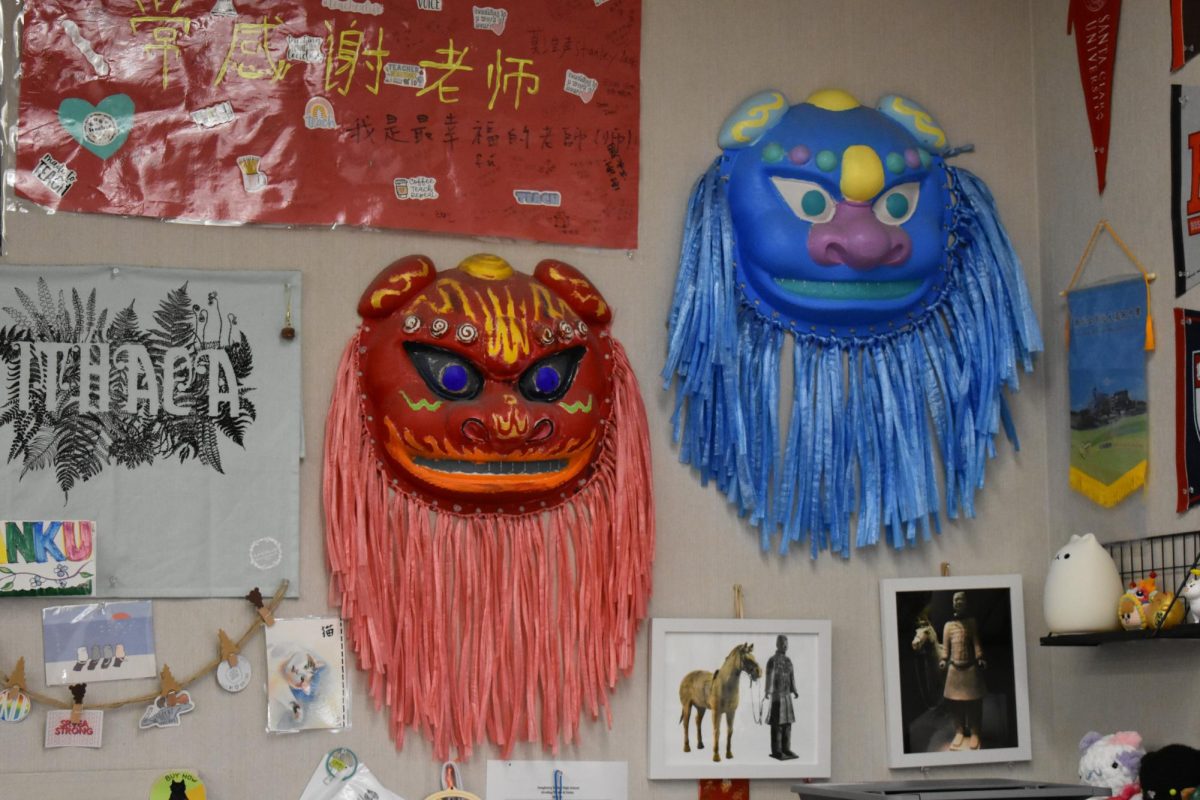
In the spring of 2025, DVHS counselors are overseeing course selection for the 2025-2026 school year. As Dougherty students continue to enroll in AP and honors classes, the question emerges of which weighted options they’re choosing, and why? Their choices will shape which classes the school offers, and which classes (even some APs) that aren’t available at all.
Although Dougherty’s class sections are affected by which teachers are able to run them, student interest is the primary arbiter of whether any weighted or unweighted course is offered. According to DV Counselor Carrie Fox, in general, fewer students select AP electives like Music Theory.
“The elective ones are the ones that usually have the smallest enrollment in them, and I think that probably makes sense, right? Because they’re electing to take the course versus it being an option for grad requirements,” Fox said.
AP Music Theory has been able to fill a class section for all of Fox’s time at the school, but others such as AP Art History vary based on the year. On the other hand, certain courses are reliably popular (especially AP Psychology for electives, AP Biology for sciences, and AP World History for social studies). By contrast, the pattern of lower weighted elective enrollment also applies to some language courses, such as AP French. Sarah Colard, who teaches the course, recounted that the French department fills two honors sections and an AP section each year – or sometimes, not even.
“Three years ago, there was not enough enrollment for AP, so they said, ‘Well, we’re not going to have AP’,” Colard said. “We were just 17 kids, but I thought AP was important still, so they gave us an AP section. We were lucky, because usually they don’t do that.”
This year, according to an informal survey by French IV Honors teacher Imin Moriya, 55% of honors French students anticipated taking the next level. From her experience, Colard theorized some students’ reasoning in not continuing to AP.
“Usually they say that their schedule is full, I think because it’s an elective, because it’s more important to take a science or a math class,” Colard said. “And sometimes the counselors, there’s problems in their schedules so it’s so hard to reorganize everything.”
Meanwhile, students share that a myriad of other factors have impacted their choice of weighted courses for next year, from personal interests to peer opinion to teacher guidance.
“If my teacher doesn’t like me and doesn’t think I should take an AP class, then I probably didn’t like their class, so it’s not like I’m going to take the harder version,” sophomore Maya Lakshman said.
Fox described how counselors, when individual students come to them for advice, examine those students’ academic records to anticipate their performance in difficult courses. Junior Melanie Chan, discussing her own selections, emphasized that previous results, rather than other Wildcats’ guidance, best predict success in a class.
“I think before, in my freshman and sophomore years, if people said, ‘oh, this class will be fine’ or ‘you’ll do fine’, I listened to that, and it was a mistake,” Chan said. “Now I’m just going with classes I think I would enjoy, and not really listen to what other people might say, like maybe how they did in the class, because everybody does a little different.”
Along these lines, individual tailoring and specificity to areas of interest are a goal for many students.
“Probably if it’s relevant to my major, that would be the biggest one,” Lakshman said. “Or I guess if it looks like it’s pretty fun and I don’t have a lot of other difficult classes, then I might take it.”
Chan is aware of rumors around the school surrounding the “best and worst teachers” for each weighted course, but tries to ignore them.
“I’ve encountered it pretty often, actually, but I usually don’t listen to that. I regret it, if I wind up getting the teacher,” Chan said with a laugh. ”But usually if I decide to take the class it’s not because of the teacher. I hope AP classes are fairly similar no matter what teacher you get. I know that’s not the case sometimes, but that’s what I hope for.”
In the long run, the counselors expect Dougherty students to keep on registering for weighted courses, and emphasize that their interest in those classes determines their availability.
“You’re probably not surprised that the culture here is ‘I can do it! I will take it on!’” Fox said. “Everything has to do with enrollment, essentially.”
Given the direct connection between a class’s popularity and its availability, Dougherty’s preference for particular courses is self-reinforcing. Which courses – STEM, languages, history and all – will be the remainder shaping the educational direction of the school as a whole, is up to students.





